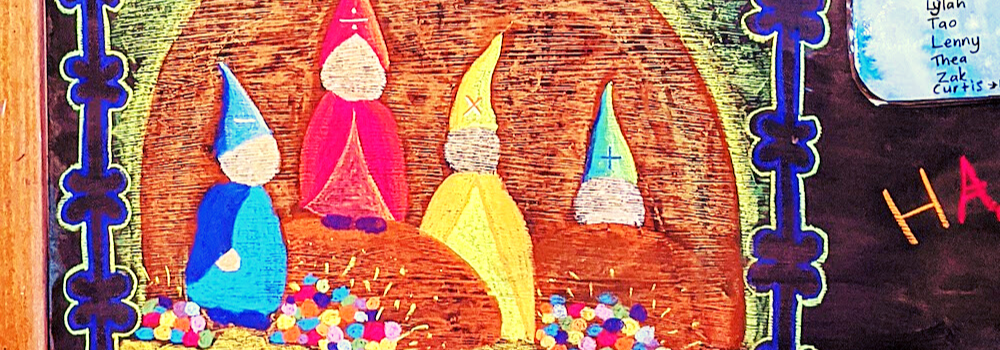Features of Steiner Education

Main Lesson
The curriculum is delivered primarily through a sequence of Main Lessons. Main Lessons are thematically based, and studied daily for 90-120 minutes across a 3-week period. There are linked across disciplines horizontally across a year and sequentially through the years, forming a very rich tapestry. This time frame allows for immersion and deep learning.
Within each Main Lesson, there is a 3-day rhythm that provides time for students to connect new concepts with previous understanding. Within each Main Lesson, there are a balance between academic content, and artistic and practical activities all based on the central theme. Other subject lessons also aim to link with the Main Lesson theme.
Early Childhood – Develop the limbs by doing
Young children from birth to age seven live primarily through their senses and learn best through imitation. Steiner Education’s primary focus is to nurture each child’s development by providing gentle, yet sensory-rich environments and play-based activities that encourage the young child to investigate the natural world, explore social relationships, and expand imaginative capacities. These activities lay crucial foundations for intellectual, emotional, and physical development.
Middle Childhood – Develop the heart through imagination
In Steiner Education, Primary school children learn best through lessons that touch their feelings and enliven their creative forces. The Steiner school curriculum is alive with fairy tales and fables, mythological sagas, and stirring biographies of historical figures. Teachers integrate storytelling, drama, rhythmic movement, visual arts, and music into their daily work, weaving a tapestry of experience that brings each subject to life in the child’s thinking, feeling, and learning while awakening their moral development and increasing their awareness of their place in the world.
Inclusive
Steiner education works for all children irrespective of academic ability, class, ethnicity or religion.
Holistic
Steiner education takes account of the needs of the whole child - academic, physical and emotional.
Based on Child Development
Steiner education is based on an understanding of the relevance of the different phases of child development to optimal learning.
Develops Enthusiasm
Steiner education develops a love of learning and an enthusiasm for school.
Develops Imagination
Steiner education sees artistic activity and the development of the imagination as integral to learning.
Tried and Tested
Steiner education is state and commonwealth funded, and considered mainstream in some countries.
Respected worldwide
Steiner education is respected worldwide for its ability to produce very able young people who have a strong sense of self and diverse capacities that enable them to become socially and economically responsible citizens.
Also, known as Waldorf education, Steiner education is a unique and distinctive approach to educating children practiced in 60 countries and cultures around the world (1200 schools and 2000 early childhood centres and kindergartens). Currently, it is one of the fastest-growing international independent school movements. The government of each country, where it is represented, recognises Steiner/Waldorf education.
Evidence / Research
Research data from a comprehensive research project on Australian Steiner schools conducted by Steiner Education Australia showed that:
- Over 80% of parents said they selected our schools because they are Steiner schools and reflected parents' own values.
- 86% of parents were satisfied with their choice - a higher result than in other similar surveys.
- 92% of parents were satisfied with an arts-based approach to learning.
- 85% of parents valued the well-rounded nature of the education, the teach-to-the-child approach, and the culture and values of the school.
- 88% of students have good relationships with their teachers and 90% reported good relationships with their peers
- Alumni results were very positive. 89% agreed that what they learnt was highly appropriate to later life, 95% agreed that attending a Steiner school has been an asset to their life and 94% would recommend a Steiner School education.
Background
The first school opened in Stuttgart in 1919 based on the understanding of child development and learning put forward by Dr. Rudolf Steiner. The first Steiner School in Australia opened in 1957. There are currently 50 independent schools in Australia and 8 State schools in Victoria, Queensland and South Australia offering an alternative Steiner Stream.
The over-arching purpose has always been to bring about a renewal of education - a broadly based global education towards wisdom and transformation as opposed to a narrower, vocational acquisition of skills and knowledge.
About Dr. Steiner
Dr. Steiner was an Austrian academic, philosopher, artist and visionary (1861 - 1925). An innovative academic, his ideas formed the basis of anthroposophy and focused on many areas including education, agriculture, medicine, architecture and social reform. His views on education and child development inform Steiner teachers.
Phone
(02) 6564 7224
Address
220 Bellingen Road, Bowraville
Office Hours
8:30am-3:30pm, Mon-Fri (during school terms)
2024 School Year
Term 1, 2024
Wednesday 31 January – Friday 12 April
Term 2, 2024
Monday 29 April – Friday 5 July
Term 3, 2024
Monday 29 July – Friday 27 September
Student Free Day Friday 6 September
Term 4, 2024
Monday 14 October – Thursday 12 December
2024 Working Bee
Due to the Long weekend in January the school working bee will be held on the 1st weekend following the 1st week of school.
Saturday 3 February 2024
8am to 1pm
Our school, staff and students, respectfully acknowledge the traditional custodians of the Gumbaynggirr nation on which we live and work. We extend this respect and reverence to all Indigenous Elders across all nations throughout the world.
Tallowood Steiner School
Website help with Social Space
